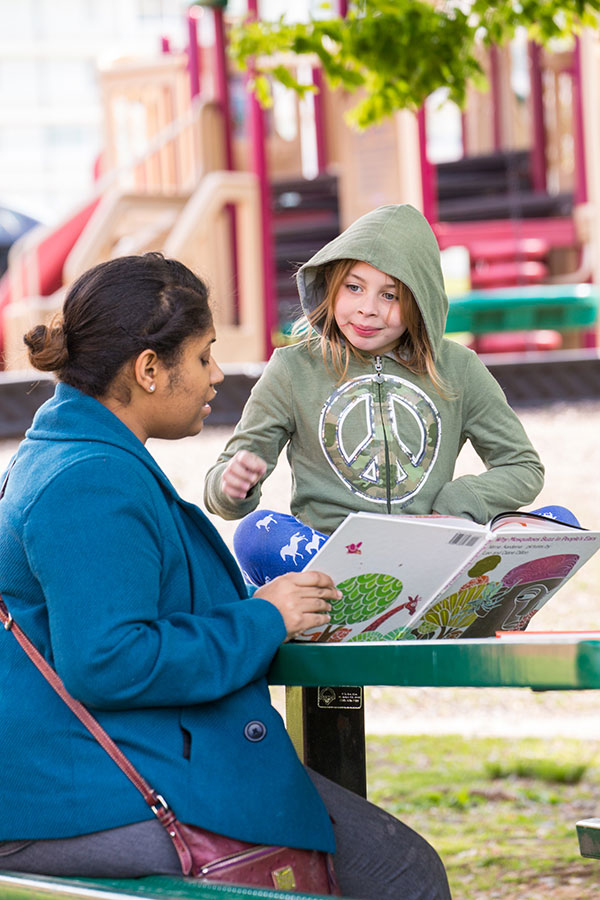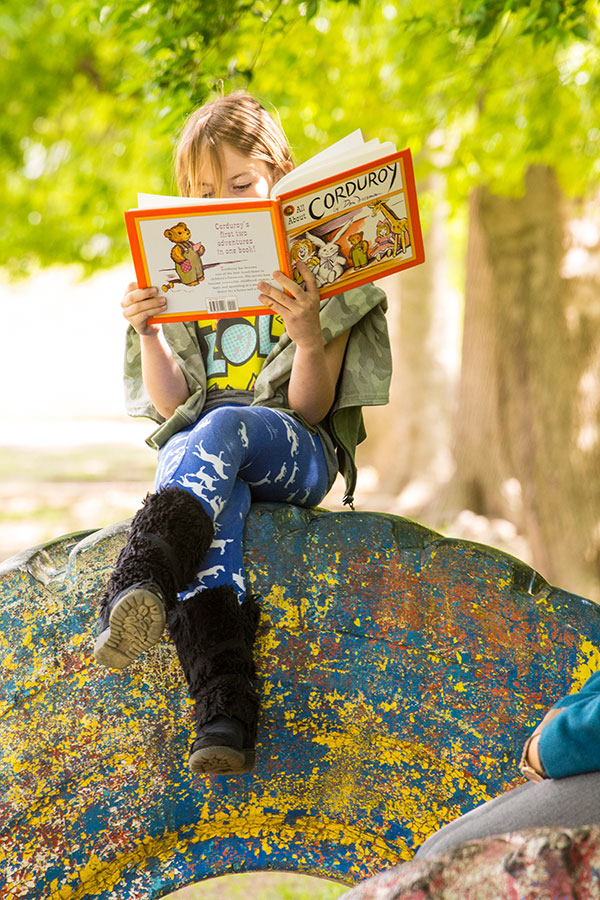
This fall marks the fourth semester that Cicely Shannon, left, has read with Dylan, a third grader at a local school. Photo by Russell Cothren.
Senior economics major Cicely Shannon’s love for books began at age four, when she learned to read. She began sharing her passion for reading in fifth grade, when she created Bookoos* of Books reading circle, the first of several literacy programs she developed in her hometown of Texarkana. Cicely has worked with the Volunteer Action Center’s Literacy Program since she arrived on campus as a freshman. Last year she chaired the program, which pairs 170 UA students with local school children. This fall, she will begin her fourth semester reading twice a week with Dylan, a wiry third grader who likes to read perched high on a tractor tire. Cicely was awarded the Truman Fellowship, which recognizes outstanding students who wish to pursue careers in public service.
*Southern speak for beaucoup, according to Cicely.
Question: So, your volunteers meet with kids enrolled in an after school program. What do you do with them? Tell us about a typical session.
Answer: It’s an hour-long program. We read for as long as possible with them –– sometimes my reader can read for an hour straight, but most children, that’s not going to keep their attention. So you go and you talk about their day, and what’s going on. I know my reader plays soccer, and she practices on Thursdays and Saturdays, so I talk to her about things like that, and then we get into reading. Sometimes we have a book we’re already reading, and sometimes we pick books out of our rolling library, and read about 20-30 minutes. Then we play literacy board games, like Scrabble, Apples to Apples, and Bananagrams. We have a dry erase board too, so we might play Hangman. It’s pretty much one-on-one, unless someone’s sick, and then you might take another reading buddy just for that day.
Question: Your reading buddy is in second grade, right? What sorts of books have you read with her?
Answer: All kinds! I can never tell what kind of day Dylan’s going to have. She’s definitely a bit of a tomboy, but then sometimes she’ll surprise me and pick up a kind of princess book. She likes science-y type books sometimes, and she likes fantasy books. I’ve read books about dinosaurs with her, and she’s reading a series right now, Guardians of Ga’hoole, and she’s also reading a series about having a good beast partner – or something like that! It’s really interesting to see what she chooses to read. I actually like the book she’s reading right now, so I’m lucky.
Question: What do you think the kids get out of this?
Answer: If they’re not a strong reader, obviously they get someone reading with them for that time every week, and some of them have two buddies, for two hours a week, focusing on them and giving them the kind of one-on-one attention they may not be getting at home, because we’ve chosen some of the lower-test-scores, lower-socio-economic-status schools in the area. We’ve been working these last few semesters to give them books, to build a book library for them, so they’re getting that out of it. But really, I think it’s the mentor relationship – just knowing that someone is going to come back. The whole point is to build this relationship. I’ve read with Dylan for three semesters now, and I’ll be reading with her this year. So it’s building that up: ok, this person is coming back, not just every week, she’s coming back every semester, just to read with me. It’s very reinforcing for them.
Question: What has been the most rewarding aspect of working one on one with the kids, for you?
Answer: I’ve worked with different students. There was a boy before Dylan, Marcus, he wasn’t a super big reader, but he had things that he loved; he was really different from me, when it comes to reading. And then Dylan likes to read, and she reads things I might have read. Both of them were really great experiences for me. With Marcus, I had to learn how to be a different mentor. It’s easy to mentor kids who’re like you, because you understand them. So even though I’m not a tomboy, as Dylan is now, I can understand what books she’s going to get into. I get satisfaction from knowing that I can adapt and work with these different types of students. Even though I’m not going to be a teacher, I know I’ll have to work with lots of different people at some point.
Adults at least try to pretend that they’re working with you. Children don’t: They just say, ‘I’m not doing that!’ and you have to work through that. I think I’ll be prepared for lots of things that could come up.
Question: You’ve been involved with literacy programs since the fifth grade. Where did that interest come from?
Answer: It was just something that I’ve always done, and it was probably my mom, starting me, because in the fifth grade, that wasn’t really something I was thinking about. It’s something I’ve never let go of, and I don’t think I ever will.
My mom will tell stories about how there was a free book thing at a neighborhood center, and we were late once. And I cried, I was so sad, and this woman gave me some books. And my mom took me to the library every Saturday, and I’d check out the max, it was 15 books, and I’d read them during the week, and then she’d take me back. Even though I was that kid who would lose one of the books, it never bothered her, she’d just pay the fine. It was definitely a really supportive environment for reading. I just really like making at least a little piece of that possible for students who may not have it at home.

